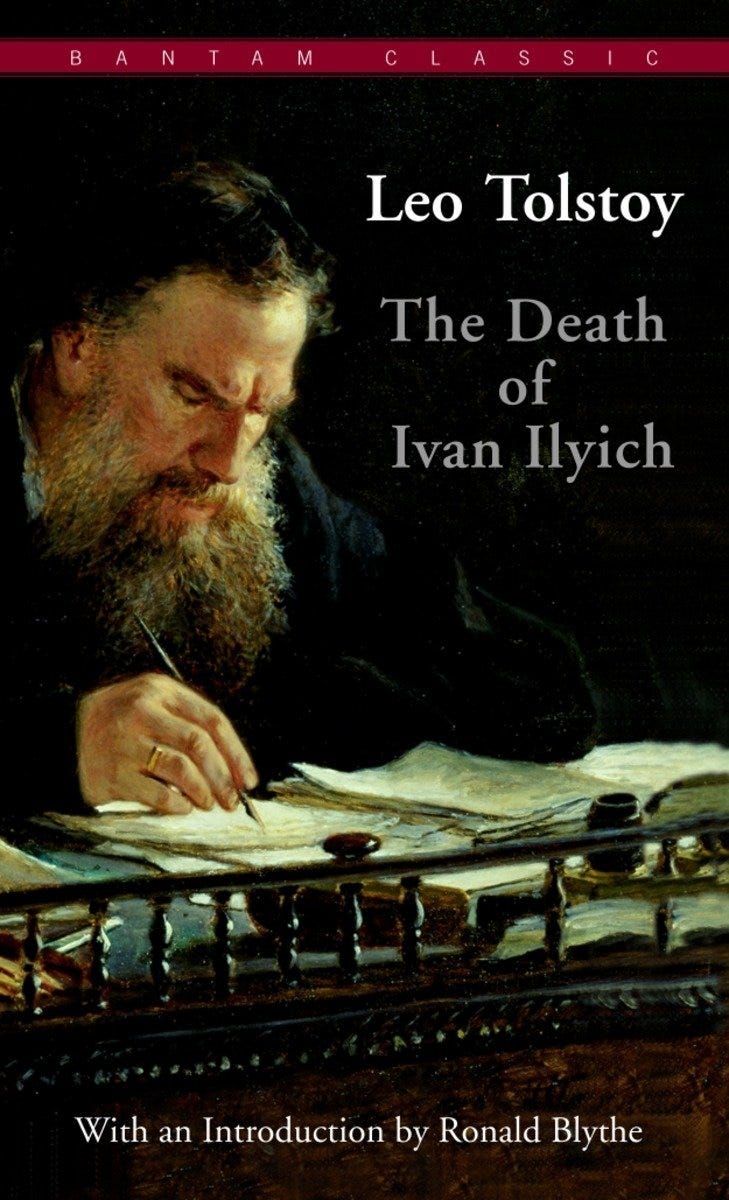Lev Tolstoy: The Death of Ivan Ilyich
It is one of his most disturbing stories. Very little happens in it, beyond the fact that Ivan Ilyich, who has a middlingly successful legal career and has become a judge, is confronted with the fact of his ow n mortality. He contracts cancer, and as he approaches the end, he views his past life as a waste of time, his future death too horrible to contemplate, and diminution and frailty and the sheer stink of his dying body with the profoundest disgust. Above all, he fears death itself. When the disease is in its early stages, he tries to put it out of his mind. ‘And what was worst of all was that it drew his attention to itself not in order to make him take some action but only that he should look at it, look it straight in the face.’ This he is unable to do, until the very end when, after three days of screaming, and months of physical and moral torment, he is able to face death, and dies. But although he has been visited by the priest he dies without religious consolation; it is merely the acceptance of mortality itself which brings him peace.
The story disturbs, and appeals, because of its universality. ‘The syllogism he had learnt from Kiesewetter’s Logic, “Caius is a man, men are mortal, therefore Caius is mortal” had always seemed to him correct as applied to Caius but certainly not as applied to himself. That Caius — man in the abstract — was mortal was perfectly correct, but he was not Caius, not an abstract man, but a creature, quite, quite separate from all others.’45 That is the syllogism which the tale enforces upon the reader. The generality of death becomes particular as we share Ivan Ilyich’s dreadful inner torments on his sickbed. No human life would emerge with any more ‘point’ or justification than his. But we would not necessarily agree with a modern scholar that Ilyich is ‘a man like many other men’ in his reaction to things. He is in fact a man very much more like Lev Nikolayevich than he is average. For example, before the illness begins, he really hates his family, and for the past twenty years, his wife has made his life a misery by her querulousness. They come together again for brief moments of amorousness and then once more the warfare between them starts up. His only happiness is snatched from his work, or his male friends, or from choosing furnishings for the house. And the illness only serves to emphasise to him the extent to which his family are strangers with him. As he lies dying, too weak even to use a bedpan without assistance, and revolted by the smell of his own breath and by his own excrement, the only individual who can bring him any consolation is the handsome young peasant servant Gerasim, whose good humour is not shaken by the smell, and who is honest enough to accept his master’s illness, and not lie to him. One of Ivan’s only comforts at this stage is being allowed to lie with his trouserless legs over the young lad’s shoulders. Health, strength and vitality in other people were offensive to him, but Gerasim’s strength and vitality did not mortify but soothed him.’ There is nothing of Everyman in this bizarre, but inescapably touching confession. But there is much of Tolstoy.
By a paradox, however, a severe illness which afflicted Tolstoy during the summer of 1886 did not produce a greater discord between himself and his wife. It had the opposite effect. He had insisted on continuing to follow the plough while suffering from a sore on his leg, and this developed into erysipelas. Tolstoy’s principles and instincts forbade him to consult a doctor, but eventually a specialist from Moscow called Chirkov was brought down by the Countess to Yasnaya Polyana. By now, the ulcer on Tolstoy’s shin was severe, and he had a fever of 104°. The leg was much swollen, and they began to despair of his life. A tube had to be inserted into the leg to drain off the fluid and this caused excruciating pain.
For nine weeks he was laid up, and the disciples — particularly Chertkov — were kept at bay. ‘Although the last two months, when Lev Nikolayevich was ill, were an agonising time for me,’ his wife wrote in her diary, ‘strangely enough they were also a very happy time for me. I nursed him day and night and what I had to do was so natural, so simple. It is really the only thing I can do well — making a personal sacrifice for the man I love. The harder the work, the happier I was. Now that he is on his feet again, he has given me to understand that he no longer needs me.’ These words were written towards the end of October 1886, but her services were still required. While he was on his sickbed, he had been composing a play [The Power of Darkness] — a work which had had to be dictated for the most part – and on October 26 Sofya Andreyevna agreed to copy out the first act.
Source: A.N. Wilson, Tolstoy, 1988



No comments:
Post a Comment